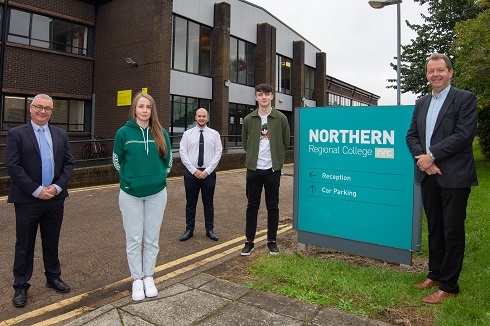Fifteen apprentices have taken their first steps on to the Rail Track Apprenticeship programme. They will spend one day in class at the College’s Ballymena campus and four days with their respective employers as they work towards achieving a City & Guilds Level 2 Rail Engineering Operative Knowledge qualification and a City & Guilds Level 2 Rail Engineering Operative Competence qualification. On successful completion of the Level 2 accredited qualifications, they will have further opportunity to explore progression to the relevant Level 3 qualifications.
Patrick Wallace, Principal Lecturer for Traineeships at Northern Regional College, said: “This programme has never been delivered in Northern Ireland before and, while there are currently railway track maintenance specialists working on the railways here, we hope the introduction of this new Railway Track Apprenticeship will provide another exciting option for our students.
“The Apprentice Railway Track Technicians will develop the necessary skills and knowledge to meet specific requirements of the role by studying engineering principles, track maintenance techniques, materials technology and rail safety.”
The apprenticeship was developed through a consultation process between government bodies, regional colleges, asset owners and track engineers.
As the skills involved in track engineering are specialised and did not fit into any programmes currently available in Northern Ireland, it was decided to deliver these qualifications as an apprenticeship framework to provide a recognised path into rail track engineering.
Mr Wallace continued: “The strong links and open communication between Translink, OTT and the College played a key role in the development of the apprenticeship programme.”
Nineteen-year-old Ben Marks, an apprentice with OTT, said the course “provided a fantastic chance to earn as you learn” whilst Translink apprentice Kimberly Garland saw it as an opportunity to undertake a career change. The 28-year-old was working in childcare when learned about the apprenticeship programme.
“It’s early days yet, but so far the course has been brilliant. I’m looking forward to developing my knowledge and skillset as I progress within my new career,” she said.
Andrew McGivern, Track Engineering Manager at Translink, said: “Railways are an increasingly important part of the transport infrastructure within Northern Ireland, providing a green alternative to private transport. High standards of track construction and maintenance are vital to the safety and performance of the railway ensuring passengers reach their destination on time every time. Rail Track Engineering is a highly skilled job that plays a key role in providing a safe, reliable service. We have an excellent workforce who are very competent in the work they do but we need to attract new people into the industry and offer them an attractive career path in order to secure the future of the railway.
“These apprentices are at the start of a journey that will help them to secure qualifications that are nationally recognised. If they successfully complete their apprenticeship, they will have the opportunity to experience a highly challenging but rewarding career in rail track engineering.”
Daryl Irwin, OTT’s Managing Director, said: “Railway maintenance workers deserve a greater recognition for their important role. Other professions can all follow a recognised apprenticeship route to get an accredited qualification, so it’s only right that railway maintenance workers will now have the same opportunity to help them progress in their careers.”

